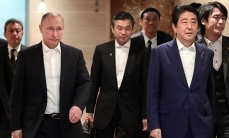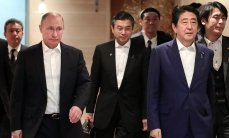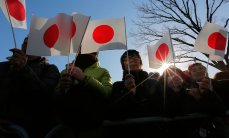Putin called for an end to “historic ping-pong” about the fate of the Kuril Islands
The Russian President noted that a solution to the territorial problem and conclude a peace Treaty Russia and Japan cannot be achieved overnight.

TOKYO, December 16. /TASS/. Russian President Vladimir Putin considers it necessary to stop “playing” with Japan in the “historical ping-pong” about the fate of the South Kuril Islands. The Russian head of state is confident that the parties need to reach a final and lasting settlement.
Read also Putin spoke about the details of the talks with Abe
Putin spoke about the details of the talks with Abe
“In our view, need to stop this historical ping-pong on the territories you need in the end, somehow understand that the fundamental interests of Japan and Russia require a final, lasting settlement, that’s what this is all about,” said Putin at a press conference after talks with Prime Minister Shinzo Abe.
Putin noted that the decision of the territorial problem and conclude a peace Treaty Russia and Japan cannot be achieved overnight.
“It would be naive to believe that we can get it (the territorial dispute concerning the South Kurile archipelago) overnight to settle, but to find a solution which would meet the strategic interests of both Russia and Japan, and would be accepted by the peoples of both countries, of course, necessary,” — said the Russian leader once again called the absence of a peace Treaty between Moscow and Tokyo, “an anachronism of the past.”
From the “Apple of discord” to long-term cooperation
The President of Russia believes that Moscow and Tokyo can turn the Southern Kuriles from Apple of discord to the factor of promotion to long-term cooperation.
These Islands, it is, if we implement the plans of Prime Minister (Shinzo Abe) may not become a bone of contention between Russia and Japan, but rather something that unites Russia and Japan.Mr Putinprime Hsitate also the Japanese will open access to previously closed area of the South Kuril Islands
the Japanese will open access to previously closed area of the South Kuril Islands
In his opinion, “if we make the right steps in the direction of the plan, proposed by the Prime Minister — and he proposed to create a separate structure for economic activity on the Islands, to enter into an intergovernmental agreement to study the mechanism of interaction”, then on this basis it is possible to create such conditions which would make the final decision on the peace Treaty.
“If someone believes that we are only interested in establishment of economic relations and a peace Treaty put off on the wayside, it is not so,” said the Russian leader.
“In my opinion, the most important is the conclusion of a peace Treaty, because it will create the conditions for long-term interaction in a historical perspective, in the medium and long term”, — said the President of the Russian Federation. He believes that “it is more important than the activities on the Islands”.
Japan has been without a deep cooperation with Russia 70 years and we lived. So you can live? Can. But would it be right? No, wrong.Mr Putinprime of the Russian Federation
He explained: “If we join forces, the competitiveness of our countries and economies will increase many times”. “This is what we must strive,” said Putin.
Free cross-border movement
Putin hopes that the joint activity in the Kuril Islands will contribute to the promotion of peace Treaty between Moscow and Tokyo.
In addition, the President of the Russian Federation proposed to introduce a regime of free cross-border movement of residents of Sakhalin and the Japanese island of Hokkaido.
See also , Japan announced on simplification of visa regime for Russians
, Japan announced on simplification of visa regime for Russians
According to the President, the meeting discussed the question of the possibility of visa-free visits by citizens of Japan — former residents of the South Kuril Islands graves of their ancestors.
“We have agreed that we will do everything in order to provide them free access even in those areas that until now were closed to them”, — Putin said at a press conference.
“For its part, has proposed to introduce a regime of free cross-border movement of residents of the Sakhalin region and Hokkaido,” added the President.